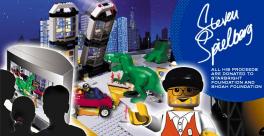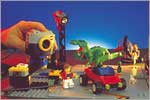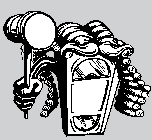
LEGO STUDIOS
Now YOU can be Steven Spielberg
By James G. DeRuvo, Hardware Editor
 Steven Spielberg's latest film creation isnít "Jurassic Park
III" (which is to be a Joe Johnston film due in 2001) or a sequel to
"E.T.: The Extraterrestrial" (which we all pray he never decides
to do). It isn't even the long-anticipated Indy 4 (which looks closer to
coming to fruition since the signing of "The Sixth Sense's" M.
Night Shyamalan to write a screenplay). No, Stevenís latest
project, in cooperation with the Lego toy company, is LEGO STUDIOS.
Steven Spielberg's latest film creation isnít "Jurassic Park
III" (which is to be a Joe Johnston film due in 2001) or a sequel to
"E.T.: The Extraterrestrial" (which we all pray he never decides
to do). It isn't even the long-anticipated Indy 4 (which looks closer to
coming to fruition since the signing of "The Sixth Sense's" M.
Night Shyamalan to write a screenplay). No, Stevenís latest
project, in cooperation with the Lego toy company, is LEGO STUDIOS.
Building on the notion that children already tell
stories when they play with their toys, LEGO STUDIOS gives them a chance
to film and share their stories with friends via the Internet or by
e-mail.
 Lego Studios contains everything a budding filmmaker needs to create not
only live action digital video shorts, but stop motion animation as well.
And this is its strong point. The software is loaded into your computer
and the editing is so simple that the kids it is designed for will be
making Lego shorts in no time. You first build your "story,"
then capture the action on the PC movie camera. Using the kid-friendly
editing software with professional functionality, you can edit your
footage and add music and sound effects.
Lego Studios contains everything a budding filmmaker needs to create not
only live action digital video shorts, but stop motion animation as well.
And this is its strong point. The software is loaded into your computer
and the editing is so simple that the kids it is designed for will be
making Lego shorts in no time. You first build your "story,"
then capture the action on the PC movie camera. Using the kid-friendly
editing software with professional functionality, you can edit your
footage and add music and sound effects.
Thereís a large
assortment of LEGO bricks and special pieces in the set that allows for
special effects and stunts. They include Quick-build Buildings that
rebuild in seconds, a Cast and crew of LEGO players and various set tools
like a Camera sled (for pans, tilts, etc.), fan, lights, and more. There
are even Guide Sticks which enable you move your characters and cars
without showing your hands on camera.
 The PC movie camera has LEGO studs on the outside housing to give it the
LEGO look and feel. The studs allow you to mount the camera firmly in
place using LEGO bricks. The camera has full-motion video and digital
still modes. Using the software and the digital still mode, you can create
stop-motion animation -- where objects appear to move on their own! The
manual focus ring allows you to zoom in on an object as close as an inch
so those LEGO figures look life size! Once you've loaded the software, all
you have to do is plug the camera in the USB port and you're ready to
film.
The PC movie camera has LEGO studs on the outside housing to give it the
LEGO look and feel. The studs allow you to mount the camera firmly in
place using LEGO bricks. The camera has full-motion video and digital
still modes. Using the software and the digital still mode, you can create
stop-motion animation -- where objects appear to move on their own! The
manual focus ring allows you to zoom in on an object as close as an inch
so those LEGO figures look life size! Once you've loaded the software, all
you have to do is plug the camera in the USB port and you're ready to
film.
You can also use your camera to communicate even when
youíre not making a film. By using the audio and video features of
Microsoft Windows Netmeeting, the LEGO camera can be used to share ideas
and information, communicate with several people at once, exchange
pictures, and send and receive real-time video. You can even use the LEGO
camera to remotely view items placed in front of the lens, or show things
to your friends in real-time.
The LEGO & Steven Spielberg MovieMaker Set also
includes an instruction booklet with "Tips & Tricks for Movie
Making," which helps you get started in a fast, fun and easy way.
Using small examples, the book shows how to use the right camera angles
and special effects.
LEGO and Spielberg worked closely with Pinnacle Systems
to make their video editing software and to make it kid friendly. Pinnacle
adapted its Studio video editing software to meet the unique requirements
of playfulness and ease of use required by the LEGO and Steven Spielberg
MovieMaker Set.
For future releases, Pinnacle Systems' is developing an
inexpensive PC USB camcorder interface. This product allows kids to use
their family's camcorder to expand their video creativity.
There are also add-on studios, including Explosion
Studios, Car Stunt Studios, Dino Head Attack, and the Temple of Gloom.
If you want to see the depth and quality of films made
with LEGO STUDIOS, go to Legoís website at http://www.lego.com
and view the shorts in Quicktime. Whether you watch DINO COP, TEMPLE OF
GLOOM, or JURASSIC BARK, youíll be amazed how this movie making kit can
create such stunning stop motion animation. And priced at $179.00, itís
the ideal Christmas gift for the child who wants to be a director when he
grows up. For more information or to buy a Lego Studios set, click
here.
Minimum PC Requirements:
Pentium 233 MMX
32 MB of RAM
DirectX 7 compatible graphics/sound card
Windows 98 Second Edition and Millennium Edition
USB Port
CD-ROM drive
100 MB hard disk space (200 MB recommended)
Internet browser (optional)


 Copyright ©
2002 by R. Scott
Bolton. All rights reserved.
Copyright ©
2002 by R. Scott
Bolton. All rights reserved.
Reproduction of material from Video Verdicts without written permission is strictly
prohibited.
This site is best viewed at 800X600 screen resolution with Microsoft
Internet Explorer.
Web Design by Rough Edge Web - webmaster@roughedge.com
Revised: October 15, 2002 02:42 PM
Pacific Time.